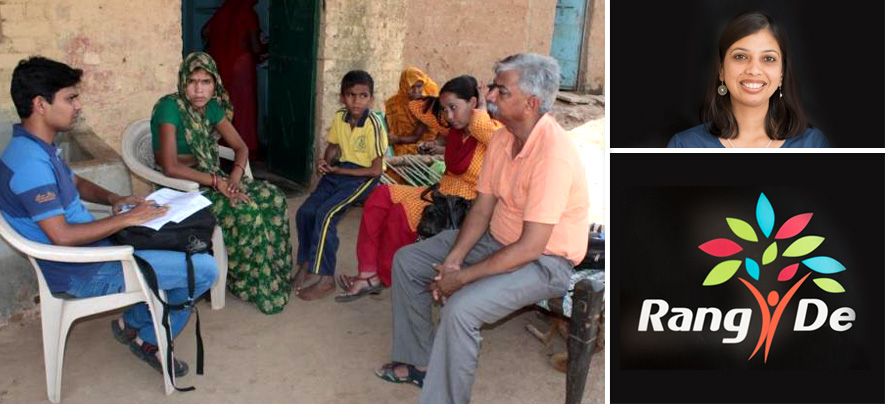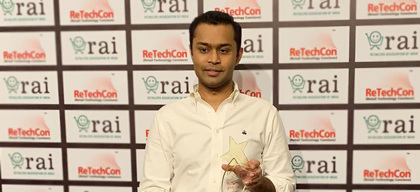This Social Enterprise is Determined to Eradicate Poverty through Microcredit

SME Inspirations
462 week ago — 10 min read
Smita Ram, Co-founder & Chief Impact Officer, Rang De, Bengaluru
Smita Ram and Ramakrishna NK, founders of Rang De are among the new breed of problem solvers of age-old issues. The duo has re-invented the way to fight poverty and support entrepreneurship through microcredit or microfinance.
Microcredit, simply put, is a loan of a very small amount. This amount is typically borrowed by the impoverished, who lack steady employment or verifiable credit history. It is designed to support entrepreneurship and alleviate poverty and in some cases empower women and uplift entire communities. Microcredit has always been considered a volatile sector with major portions of loans being lost as bad debts, but this has not deterred Smita Ram and Ramakrishna NK. Leaving behind lucrative careers abroad and starting from scratch, the duo has not only created new solutions to old problems but has also uplifted many lives by their initiative.
Rang De was established in 2008, and since then they have collectively changed more than 40,000 lives. In September, 2015, Ratan Tata, Tata Trusts, extended his support to Rang De for a period of four years.
GlobalLinker (GL) spoke to Smita Ram, Co-founder & Chief Impact Officer, Rang De, to know more about the inspiring initiative and her journey in launching this venture. Smita Ram has completed her BA Mass Communication and has a Master’s degree in Social Work. She has also completed a Certificate Course for Women Entrepreneurs from the Indian School of Business, Hyderabad. She continued her education in United Kingdom where she volunteered with Oxfam and then worked with the directorate of children, young people and families, before moving to India.
Excerpts from the interview.
GL: Why microcredit and how did Rang De take shape?
Smita: In 2006, Muhammed Yunus won the Nobel Peace Prize for his work and that’s when Ram and I stumbled upon microcredit. We started to read about microcredit from an Indian perspective and realised that interest rates in this space were exorbitant. It hovered anywhere between 36 and 40% APR (annual percentage rate). We also read media reports on the plight of borrowers of microcredit in Andhra Pradesh, who committed suicides because of their inability to pay loans. We thought microcredit was indeed a powerful tool to help people come out of poverty and we decided to do something about it. That's how Rang De was born.
We returned to India and created a platform to connect the haves and have-nots in a manner that keeps the community’s best interests at heart. To provide affordable microcredit to the poor was and remains Rang De’s key objective. Rang De now collects social capital provided by over 8,500 socially conscious individuals across the globe and ensures that it reaches the borrowers at low costs.
GL: How did you make it work, since microcredit is not traditional loan medium?
Smita: I was introduced to community work by my grandmother. Among other social initiatives such as managing women’s groups and volunteering, my grandmother started a school for the underprivileged, where my grandfather and her taught for free. I didn’t really believe her when she said, “Don’t worry about money, that’ll come. Just be sincere in whatever you’re doing.” But Rang De has proven her right.
The main challenge that Rang De faces is that microcredit traditionally has not been considered a cause. If you look at Indian social issues, the root cause for most of them - education, health, sanitation, accommodation - is poverty. The best tool we can use to start the process of eradicating poverty is microcredit. There are also a lot of myths about low-income groups over their creditworthiness and whether they will repay the loans. The 99% repayment rate we have achieved over seven years has come by working with field partners like the Swami Vivekananda Youth Movement who are embedded in these communities.
Also, we have found that it takes a lot of time for people to trust even to lend Rs 100, a minimum amount they can invest in. That Rs 100 will come back to them in the next month with interest.
GL: How has going online helped the cause?
Smita: It has made a huge difference. Traditionally, microfinance institutions borrowed capital from banks and added the cost of servicing before disbursing the loan at rates ranging as high as 24% - 36%. Online fundraising reduces the cost of borrowing substantially, to as little as 4.5 to 10% per annum for collateral free loans.
Rang De's online peer-to-peer lending platform connects low-income borrowers to individuals who desire to help through non-traditional charitable giving. Rang De connects borrowers and investors in a transparent, accountable manner. By creating an easy to use, trustworthy platform, Rang De provides social investors an avenue to channel their philanthropic capital directly to end beneficiaries. On the other hand, the online platform allows borrowers to seek loans at very low interest rates, in fact, the lowest in the industry, at terms that are attractive to them.
GL: How would you summarize your achievements so far?
Smita: With Rs 40 crores disbursed over seven years with the help of 8,530 social investors, impacting 41,490 lives (95% of them being women) in 17 states, we believe we are just getting started. We want to reach a stage where we can give out Rs. 5 crores every month to really knock out poverty.
We are also focusing on the poorest of the remote sectors. Some of our work takes place in remote areas such as Khurda, two hours away from Bhubaneshwar in Orissa, where you cannot even take a car to get to the village. We also offer education loans to deserving students at 3%, possibly one of the lowest rates in the country.
GL: What inspires you?
Smita: It is inspiring to see somebody's life change because of a small loan given to her. A woman who was never a decision-maker of the family in these remote places becomes one the minute she turns financially independent. People begin to respect her.
For example, we met Guddi, from Madhya Pradesh, who wanted her two sons to study in a private school. She herself couldn’t complete her primary education but insisted on getting quality education for her sons. As soon as she secured a loan amount of Rs 20,000 from our social investors, she immediately enrolled her sons in a private school, which is approximately seven kilometers away from her village. Now, her sons have started teaching her how to read and write. She now is able to write her own name. Stories like these inspire us to keep on moving ahead and follow our heart.
GL: Your website also features an online store - Habba? Tell us about this.
Smita: Whenever we visited artisan communities, we saw that even though we were giving loans, they were not making the desired impact. They kept coming back for loans and earning the same amount as there was no access to urban markets in the villages and there were a lot of middlemen.
For example, few Madhubani paintings were bought at Rs 80 from the craftsmen and then marked up to Rs 5,000 in cities. The general observation is that less than 10% of the final sale price goes to the artisans. Many of them are even abandoning their craft and working on NREGA construction projects whose minimum prescribed wage actually pays more.
Habba is an e-commerce website that aims to sell such products with a feature called Honest Pricing - if this kurta is for Rs 500, you will get to see why you paid that amount – the raw material costs, what wage the artisan gets (her wage is guaranteed) and other costs.
As a non-profit, we want to make sure that the artisan gets the maximum percentage of the sales price. If we sell a high volume on the website, then the artisans get a bonus that will be disbursed to their communities. ‘Habba’ means celebration in Kannada. We wanted to celebrate the lives of rural artisans and we wanted to celebrate the people that are ready to help them.
GL: What is your advice to aspiring entrepreneurs?
Smita: When we started Rang De, we were confident that we would fail but we never wanted to feel that we never tried. In hindsight, this readiness to fail has been our greatest strength. Following one’s passion with a little bit of planning and calculated risk-taking can lead entrepreneurs to achieve great heights.
Smita Ram is one of the many business owners to access the big business advantage on GlobalLinker.
Disclaimer: This article is based solely on the inputs shared by the featured member. GlobalLinker does not necessarily endorse the views, opinions & facts stated by the member.
Posted by
GlobalLinker StaffWe are a team of experienced industry professionals committed to sharing our knowledge and skills with small & medium enterprises.
View GlobalLinker 's profile
SME Inspirations
Most read this week
Trending
Ecommerce 4 days ago












Comments
Please login or Register to join the discussion